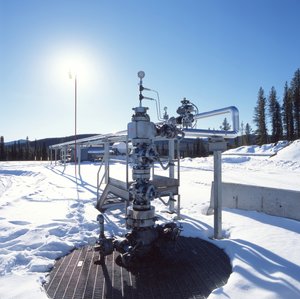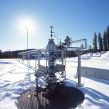
MARKET ECONOMICS TAKES A DRUBBING IN RUSSIA-UKRAINE GAS DEAL
Publication: Eurasia Daily Monitor Volume: 3 Issue: 5
By:

If the Soviet Kremlin invoked “internationalism” to cover the expansionism of the Soviet state, President Vladimir Putin’s Kremlin invokes free-market economics to cloak the Russian state’s use of the energy trade for rebuilding its power in Eurasia. Some key European officials seem to have accepted those free-market pretenses at face value during the dispute between Russia and Ukraine over the price of gas.
In fact, the Moscow-triggered dispute over gas is not about commercial issues, but rather about Ukraine’s national independence and form of governance; the agreement signed on January 4 almost certainly marks but a stage in that ongoing dispute; and the agreement itself — including the elements that continue to surface — signifies a massive setback to market economics. Failure in Europe to recognize this reality is inhibiting the development of a common European response to the Kremlin’s strategy.
The dispute has highlighted Gazprom’s subordination to the Kremlin beyond denial. Day after day on live television, Putin acted as Gazprom’s real chief, taking reports from the supine nominal chiefs and instructing them in detail about the position to take in negotiations with Ukraine on prices and transit. Putin initiated even the tactical shifts in Gazprom’s position during the endgame of negotiations.
Quite apart from the issue of who won and who lost, the deal is one between state monopolies of very unequal strength. Gazprom demonstrated that mismatch, first, by demanding a more than threefold price increase at one stroke, from $50 to $160 per 1,000 cubic meters (the position from June through December); then, by slapping a punitive increase to $230 hoping to break Kyiv’s resistance (from December 13 onward); and finally, by threatening to escalate to $280 (on January 3, hours before Kyiv decided to come to terms). Such price hikes are the antithesis of market behavior and are made possible by Gazprom’s dual monopoly: on Russian supplies and on the transit of non-Russian supplies to the end user country.
Insertion of RosUkrEnergo, a secretive entity surrounded by corruption allegations, into this deal marks another setback to market relations in a vast area from Central Asia to Russia to Ukraine. The Kremlin pressured the Ukrainian government into accepting RosUkrEnergo as the sole operator of all of Ukraine’s gas imports under this five-year agreement. This move seems designed in part to raise questions in Brussels about implementing the European Union’s decision to confer the market-economy status to Ukraine. The EU announced that political decision last month. In the ensuing weeks, the Kremlin’s staging of the gas dispute seemed designed in part to portray Ukraine as an unreliable partner to Europe. This effort seems likely to continue, and the role of RosUkrEnergo can come in handy in this regard.
Some observers have welcomed the switch to cash payment of the transit fees (instead of barter payments, gas-for-transit) as evidence that market economics is taking over at least in this respect. Gazprom will pay $1.60 (a low fee even by regional, let alone European standards) for the transit of 1,000 cubic meters of Russian gas per 100 kilometers of Ukrainian pipelines en route to the West. At the same time — as Naftohaz Ukrainy vice-chairman Andriy Lopushanskyy has just disclosed (Interfax-Ukraine, January 6) — the traditional barter system of gas-for-transit-service remains in effect in RosUkrEnergo’s relationship with Ukraine.
That shadowy company is slated to transport a staggering 40 billion cubic meters of Turkmen gas annually to Ukraine through Gazprom’s pipelines in Russia. Ukraine will pay the transit service fees to RosUkrEnergo (not to Gazprom) in the form of gas. The transit fees continue to be valued as heretofore, at $1.09 per 1,000 cubic meters per 100 kilometers of pipelines. The barter formula remains that agreed in 2004 by the administration of then-president Leonid Kuchma and then-prime minister Viktor Yanukovych with the Kremlin: RosUkrEnergo retains 37.5% of the annual volume of gas it delivers to Ukraine. At 40 billion cubic meters annually from 2006 onward, RosUkrEnergo stands to retain some 15 billion cubic meters of low-priced Turkmen gas and resell that at high profits on European markets.
(Interfax-Ukraine, UNIAN, Channel Five TV [Kyiv], January 6, 7; Ukrayinska pravda, January 6; see EDM, January 3-6)




